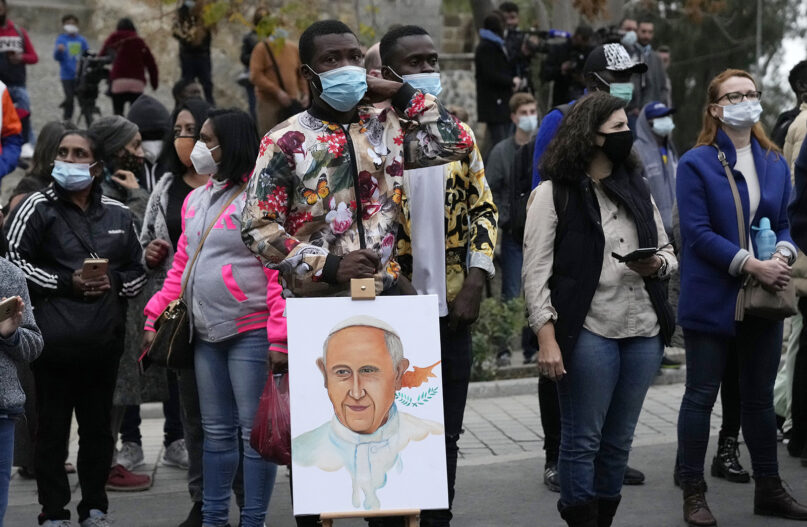VATICAN CITY (RNS) — On the last day of Pope Francis’ apostolic visit to the island of Cyprus, the Vatican Press Office announced he will be taking 12 immigrants and refugees in Greece and Cyprus back to the Vatican.
When Pope Francis visited a refugee camp on the Greek island of Lesbos in April 2016, he decided to take 12 immigrants and asylum seekers back with him to Rome, Italy. On Friday (Dec. 3), the Vatican Press Office announced the pope will do so again on this trip.
The process was made possible through the cooperation of Cypriot and Italian authorities, the Vatican’s department for immigrants and refugees and the lay Catholic movement of St. Egidio, which has been at the forefront of establishing humanitarian corridors to transport migrants legally and safely.
During an ecumenical prayer in Nicosia, Cyprus, Pope Francis met with some of the refugees who will be returning to Rome with him.
“You are no longer strangers, you are citizens,” Pope Francis told migrants during the prayerful event on Friday, quoting from the letters of St. Paul, who inspired the Dec. 2-6 papal trip to Cyprus and Greece.
Pope Francis spent his last afternoon on the island of Cyprus celebrating an ecumenical prayer with migrants in the Catholic church of the Holy Cross, located at the border of the United Nations’ buffer zone separating Cyprus from the northern portion of the island, which is under Turkish control.
The UN buffer zone has become a limbo for migrants illegally entering the country through Turkey. The Cyprus government has accused Turkey of ferrying migrants onto the island to weaken its already struggling economy and health care system.
“Many of the migrants who are arriving are arriving through Turkey” said Elizabeth Kassinis, executive manager at Caritas Cyprus, part of a global network of Catholic anti-poverty programs. Kassinis, who delivered a speech at the ecumenical prayer, told Religion News Service that many migrants end up in the northern part of the island where European regulations are not effective because it’s not part of the Republic of Cyprus.
The pope listened to the testimonies of immigrants and asylum seekers at the church on Friday and said their witness was “like a mirror” for Christian communities. The migrants spoke about being judged for their country of origin and being “wounded by hate.”
“Hate has also poisoned relationships between us Christians,” the pope said. “It is a poison hard to remove, a twisted mind-set that, instead of letting us see ourselves as brothers and sisters, makes us see one another as enemies, as rivals.”
Francis urged people to “not be afraid of our differences, but of the closed-mindedness and prejudice” that can prevent dialogue and encounter. Christ is found “in the faces of our marginalized and discarded brothers and sisters,” he said.
“He asks us not to be content with a divided world, divided Christian communities, but to journey through history drawn by his own dream: the dream of a humanity freed of walls of division, freed of hostility, where there are no longer strangers, but only fellow citizens. Fellow citizens who are diverse, yet proud of that diversity and individuality, which are God’s gift. Fellow citizens reconciled and at one,” he added.
The pope expressed his hope that the island of Cyprus, “marked by a painful division,” would become a “workshop of fraternity.” For this to happen, he continued, the dignity of the human person must be recognized, and there must be “a trusting openness to God, the Father of all.”
“If these two things can happen, the dream can translate into a daily journey, made up of concrete steps from conflict to communion, from hate to love,” the pope said, “a patient journey, which, day by day, leads us to the land God has prepared for us.”
RELATED: Pope heads to Cyprus and Greece, raising hopes he will change conversation on refugees
Before speaking at the church, Pope Francis celebrated Mass at the GSP stadium in Nicosia before roughly 10,000 Catholic faithful and non-faithful alike, where he called for unity and reconciliation in the divided island.
Catholics only represent a little under 5% of the small island-state, where the majority are Orthodox. Most of the faithful attending the Mass at the stadium come from the Philippines and other Catholic countries, which reflects the increasingly multicultural identity of Catholicism in Cyprus.
“While there is a historic Catholic community in Cyprus,” Kassinis said, “the more modern face of Catholicism is the large migrant congregations.” Many migrants coming from the Philippines, Africa and Europe have changed the face of the Catholic community in the island, she said, adding that, on the island, “Catholic parishes are full of migrants.”
The increase in the number of immigrants in Cyprus, representing a diverse spectrum of ethnicities and nationalities, has contributed to the rise of populism in the small state. The anti-immigration sentiment in the country is “a concern,” Kassinis said, that “raises a very difficult discussion on how to confront change, diversity and ensure tolerance in a society that is increasingly multicultural.”
Pope Francis will be leaving Cyprus on Saturday for Athens, Greece, where he will stay until Monday (Dec. 6).
RELATED: In Biden’s visit with the pope, a page from Reagan’s playbook?





